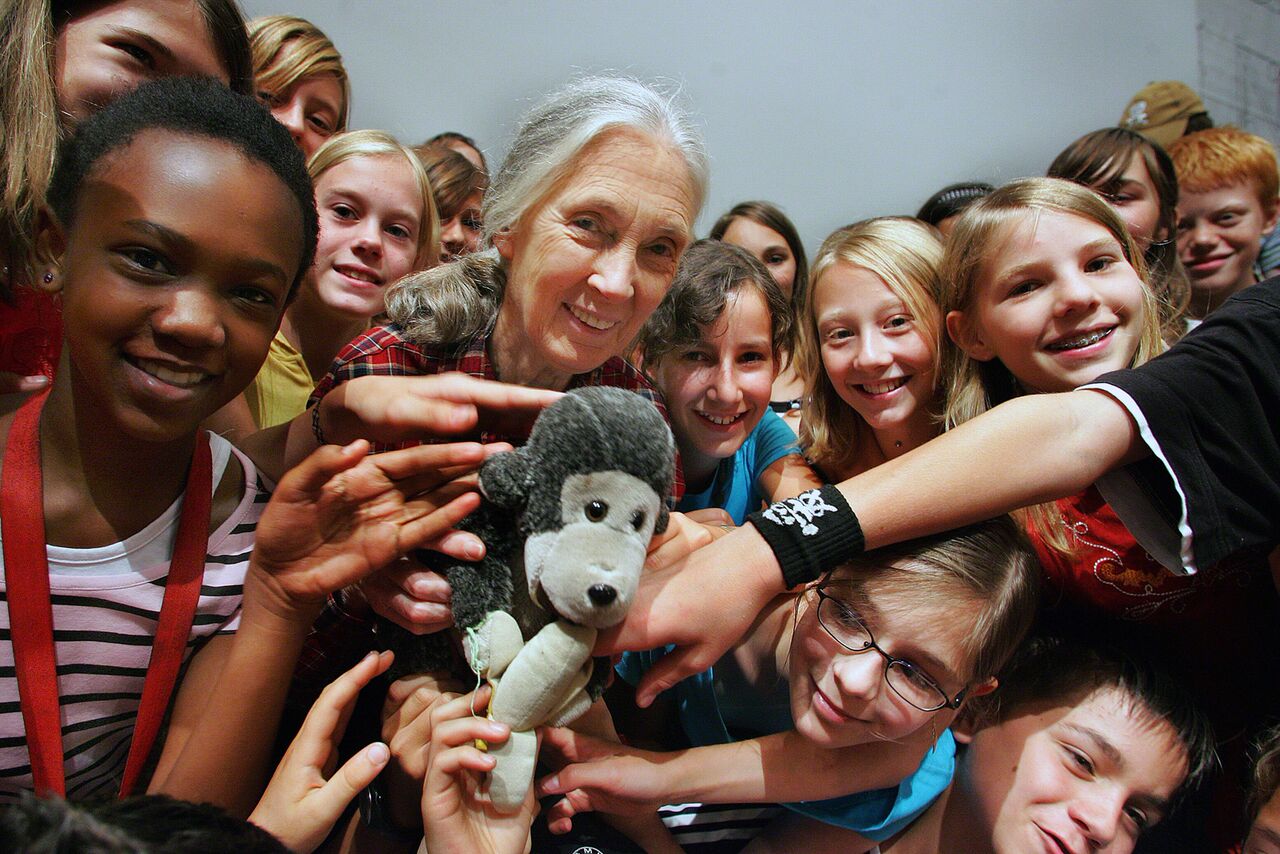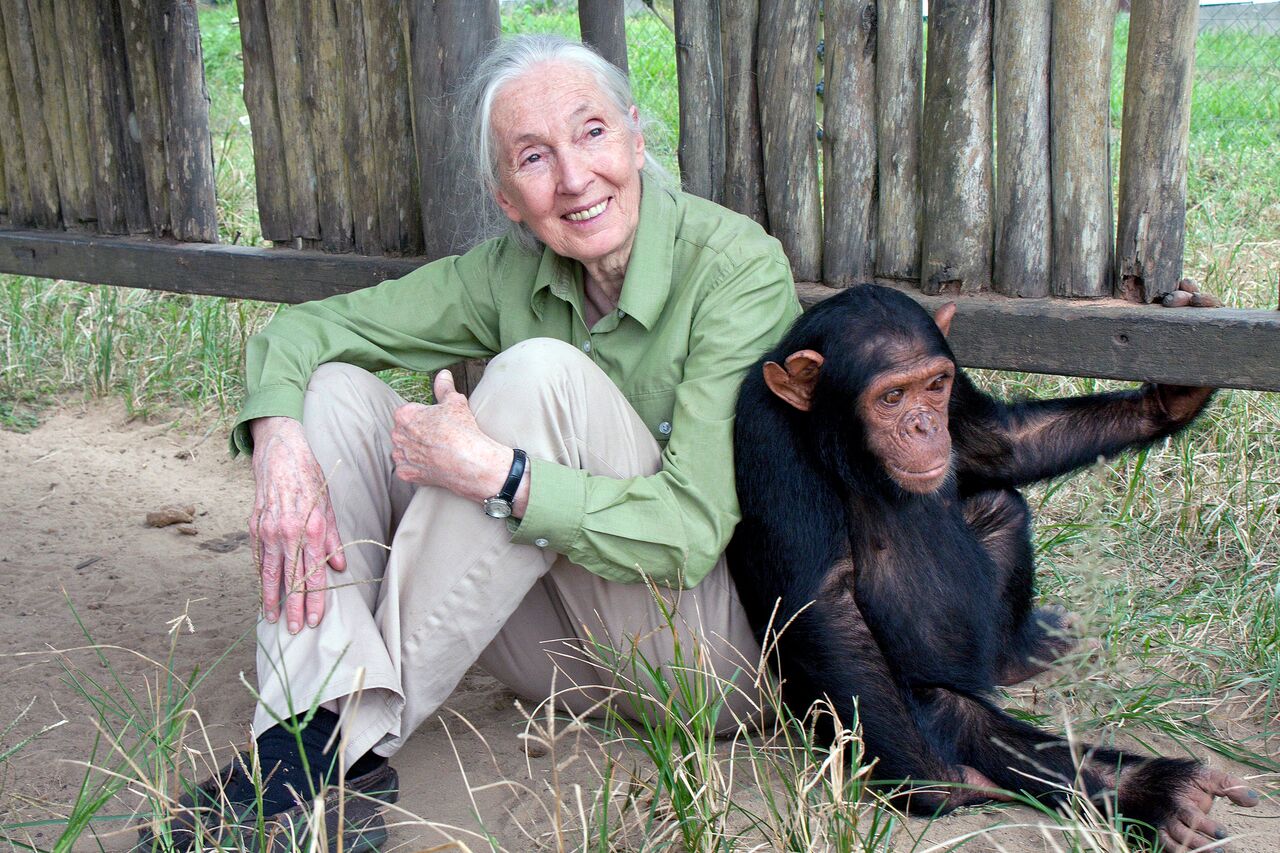KINGSTON, R.I. — July 18, 2017 — Renowned animal behavior expert, conservationist and United Nations Messenger of Peace Jane Goodall will speak at the University of Rhode Island as part of its 2017 fall Honors Colloquium. The lecture is also part of her tour associated with the Jane Goodall Institute’s 40th anniversary celebration.
The fall lecture series, “Origins: Life, the Universe and Everything,” will examine some of the following questions: “Where did we come from? How did the universe begin? How did intelligent, rational beings arise? And, from such humble beginnings, how did we develop a mind that can ask these big questions?”
Goodall will speak Sept. 19 at 7 p.m. at The Ryan Center, 1 Lincoln Almond Plaza, Kingston. The Honors Colloquium, now in its 54th year, is the University’s premier public lecture series. All talks are free and open to the public. The event will be live streamed online.

Goodall’s discovery that chimpanzees make and use tools revolutionized the world of primatology and redefined the relationship between humans and animals. At the invitation of famed anthropologist and paleontologist Louis Leakey, she began her research in 1960 at what was then called the Gombe Stream Chimpanzee Reserve in Tanzania.
“Dr. Goodall comes quickly to mind when we think of scientists and women in science. Her tremendous work has inspired countless members of our species to dig in and learn more about our place in nature, including many URI students, staff, faculty and me,” said Holly Dunsworth, associate professor of anthropology and chair of the Department of Sociology and Anthropology.
In 1977, Goodall established the Jane Goodall Institute, which continues the work of the Gombe Stream Research Center and is a global leader in the effort to protect chimpanzees and their habitats. It is widely recognized for building on Goodall’s groundbreaking, community-centered approach to conservation and development programs in Africa and for its Roots & Shoots program, the global environmental and humanitarian youth initiative she founded in 1991 with a group of Tanzanian students. The youth program connects more than 15,000 young people in nearly 100 countries, equipping them to make the world a better place for people, animals and the environment.
Today, Goodall travels an average of 300 days per year, speaking about the threats facing chimpanzees, other environmental crises and her reasons for hope. In her speeches and books she emphasizes the interconnectedness of all living things and the collective power of individual action, urging her audiences to recognize their personal responsibility and ability to effect change.
“Every individual matters,” she said, “Every individual has a role to play. Every individual makes a difference.”
Her life and work are the subject of numerous television documentaries, as well as the 2002 film, Jane Goodall’s Wild Chimpanzees, and the 2010 documentary, Jane’s Journey. Discovery Channel’s Animal Planet has produced a number of features on Goodall, including Jane Goodall’s Return to Gombe, Jane Goodall’s State of the Great Apes, When Animals Talk, Jane Goodall’s Heroes and Almost Human.
She is the recipient of the Medal of Tanzania, the National Geographic Society’s Hubbard Medal, Japan’s Kyoto Prize, the Benjamin Franklin Medal in Life Science, the UNESCO 60th Anniversary Medal and the Gandhi/King Award for Nonviolence. In 2004 during a ceremony at Buckingham Palace, she became Dame Commander of the British Empire. In 2006, she received France’s highest award, the Legion of Honor.
“We are very fortunate to have secured Jane Goodall as a speaker in our fall colloquium on ‘Origins’,” said coordinator Joel Chandlee, professor of cell and molecular biology. “She can provide valuable insights from a lifelong perspective into the relationship between humans and the natural world and the relatedness and interconnectedness of all life on the planet.”
Joining Chandlee and Dunsworth as colloquium coordinators are: Dawn Cardace, associate professor of geosciences; Albert Kausch, professor of cell and molecular biology and director of the Plant Biotechnology Laboratory; and Alycia Mosley Austin, assistant dean for graduate recruitment and diversity initiatives and associate director for the Interdisciplinary Neuroscience Program.
Sponsors: URI Office of the President • URI Office of the Provost • 125th Anniversary Steering Committee • URI Foundation • The Mark and Donna Ross Honors Colloquium Humanities Endowment • The Thomas Silvia and Shannon Chandley Honors Colloquium Endowment • URI College of Arts & Sciences • URI College of Pharmacy • URI John Hazen White Sr. Center for Ethics and Public Service • URI Gender and Women’s Studies Program • URI Office of Community, Equity and Diversity • URI College of Engineering • URI College of the Environment and Life Sciences • URI College of Health Sciences • URI College of Business Administration • URI College of Nursing • URI Division of Student Affairs • URI Department of Communications and Marketing • URI Department of Publications and Creative Services • URI ITS Instructional Technology and Media Services • URI Feinstein College of Education and Professional Studies • George and Anne Ryan Institute for Neuroscience

